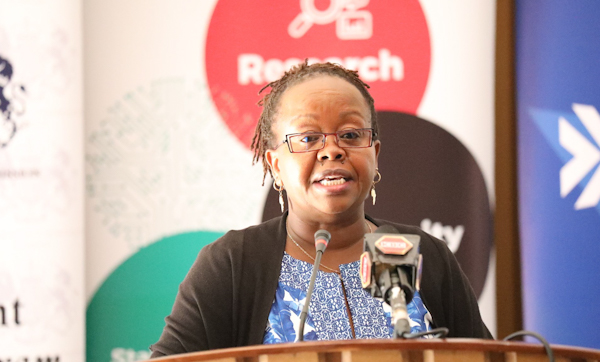Investing in sustainable infrastructure promotes social inclusion and addresses inequality in a society where everyone can contribute and benefit to ensure the level of connectivity is safe to enable users to have a satisfying online experience that is affordable.
This was a call to UK’s Digital Access Programme Partners when they met at Strathmore University on May 4, 2022, for an open day with the common goal of deliberating potential solutions to support the connectivity of those who are still unconnected and contributing to the meaningful connectivity of those who have yet to benefit from the digital economy.
The open day which was facilitated by Kenya ICT Action Network (KICTANet) was organized by the International Telecommunication Union (ITU) and United Kingdom’s Digital Access Programme (DAP) partners in Kenya, themed “Partnering for effective connectivity and broader digital inclusion.”
During the discussions, infrastructure remained largely inadequate across the country. For instance, Mr. Christopher Kemei, Director of Universal Service Fund (Communications Authority), disclosed the access gaps.
Kemei said 96 percent of Kenya is covered by 3G and 4G networks. However, 56.3 percent of the population is not covered while 44 percent is completely without.
As a result, the Authority will invest Ksh 21 billion over the next 5 years through the Universal Service Fund (USF) aimed at “completely, digitally transforming the country”.
In addition, the USF strategy has been reviewed to cover the 2022-2026 period, anchored on three pillars: infrastructure and services, physical connectivity, and broadcasting infrastructure and services.
Ms. Esther Koimett, Principal Secretary, State Department of Broadcasting and Telecommunications, through Ms. Juliana Yiapan, Ministry of Information, Communications, and Technology, Administration Secretary, corroborated the sentiments, stating that policies such as the National ICT Policy, the Broadband Strategy, and the Digital Economy Blueprint have continued to enhance digital inclusion.
The ministry noted that in the policy documents, digital inclusion is aimed at facilitating ICT accessibility, connectivity, affordability, and usability for all people, and particularly facilitates the participation of women, youth, persons with disabilities, the elderly, people from lower socioeconomic groups, vulnerable people, and the minority and marginalized populations of Kenya.
Before the coronavirus pandemic, in Kenya, investment in infrastructure was well below the levels needed to achieve global development goals. PS Koimett however, says, “COVID-19 presented an unprecedented opportunity for cross-sector collaboration to bridge the “The digital divide enables unforeseen growth opportunities for the economy and society.”
Ms. Nicole Gregory, the British High Commission Head of People and Partnerships, said the UK Government emphasized that digital inclusion is not an end in itself, “through shared lessons, it is possible to co-create solutions, making digital solutions sustainable.”
Ms. Grace Githaiga, Convenor KICTANet, further said that besides COVID-19 bringing more people online, “there is still a huge population that is hardly served by the new technologies.”
In addition, a majority cannot afford to connect online due to data costs, and lack of internet-enabled devices. As a result, KICTANet has collaborated with the sector regulator, CA, and other partners in formulating a Licensing and Shared Spectrum Framework for Community Networks.
Ms. Githaiga emphasized that Community Networks are one way of inclusion of digitally marginalized groups.
On the other hand, however, due to a significant uptake in the demand for internet access resulting from the coronavirus pandemic and remote working and learning, there has been an increase in cyber-attacks and therefore the need for cybersecurity.
KICTANet with the support of the UK’s DAP program through Government agencies led by the ICT Authority, together with the Communications Authority of Kenya, Kenya Film Classification Board, Ministry of ICT, and Youth Affairs are working on producing a cyber hygiene curriculum, and Information, Education, and Communication materials aimed at enhancing people’s contribution to the digital economy in a safe and secure way. The project will promote a Cyber hygiene culture among the DAP partners, and build capacity in cyber hygiene practices.
During the sessions, key areas that were focused on included systemic enhancement and enabling an environment for last-mile internet connectivity.
Other areas were sustainable business and financing models for connectivity; Supply and demand: Digital government services, relevant local digital content, and digital literacy and skills.
A major takeaway from the deliberations was that together with investments in internet infrastructure, the cost of internet access should be brought down to ensure equal opportunities for all and to spur economic growth.
The open day ended with a consensus that digital inclusion is not just about the physical infrastructure of development but also depends on how investments are coordinated with each other and complemented by supportive policy measures that address local needs.
The UK Digital Access Programme was developed in 2018/2019 following an in-depth diagnosis of digital inclusion barriers and opportunities.
The aim is to increase digital inclusion, through the support of systemic enablers and scalable models for affordable last-mile connectivity, digital literacy and skills, and locally-relevant digital content and services.
The UK DAP program is in 5 countries: Kenya, Nigeria, South Africa, Brazil, and Indonesia.
David Indeje is KICTANet’s Communications Officer. He is a Kenyan Journalist with a depth of experience in journalism, and development communication.
@David_Indeje | LinkedIn
![]()




